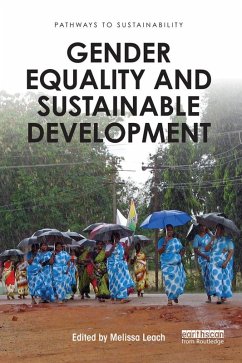This book calls for policies, investments and initiatives in sustainable development that recognize women's knowledge, agency and decision-making as fundamental. Such gender-equitable approaches can improve resource productivity and efficiency and enhance ecosystem conservation and sustainable use. They can also build fairer and greener economies, and more sustainable, low-carbon and climate-resilient food, energy, water and sanitation, and health systems. Four key sets of issues - work and industrial production; population and reproduction; food and agriculture, and water, sanitation and energy - provide focal lenses through which the book's chapters consider these challenges.
Dieser Download kann aus rechtlichen Gründen nur mit Rechnungsadresse in A, B, BG, CY, CZ, D, DK, EW, E, FIN, F, GR, HR, H, IRL, I, LT, L, LR, M, NL, PL, P, R, S, SLO, SK ausgeliefert werden.

